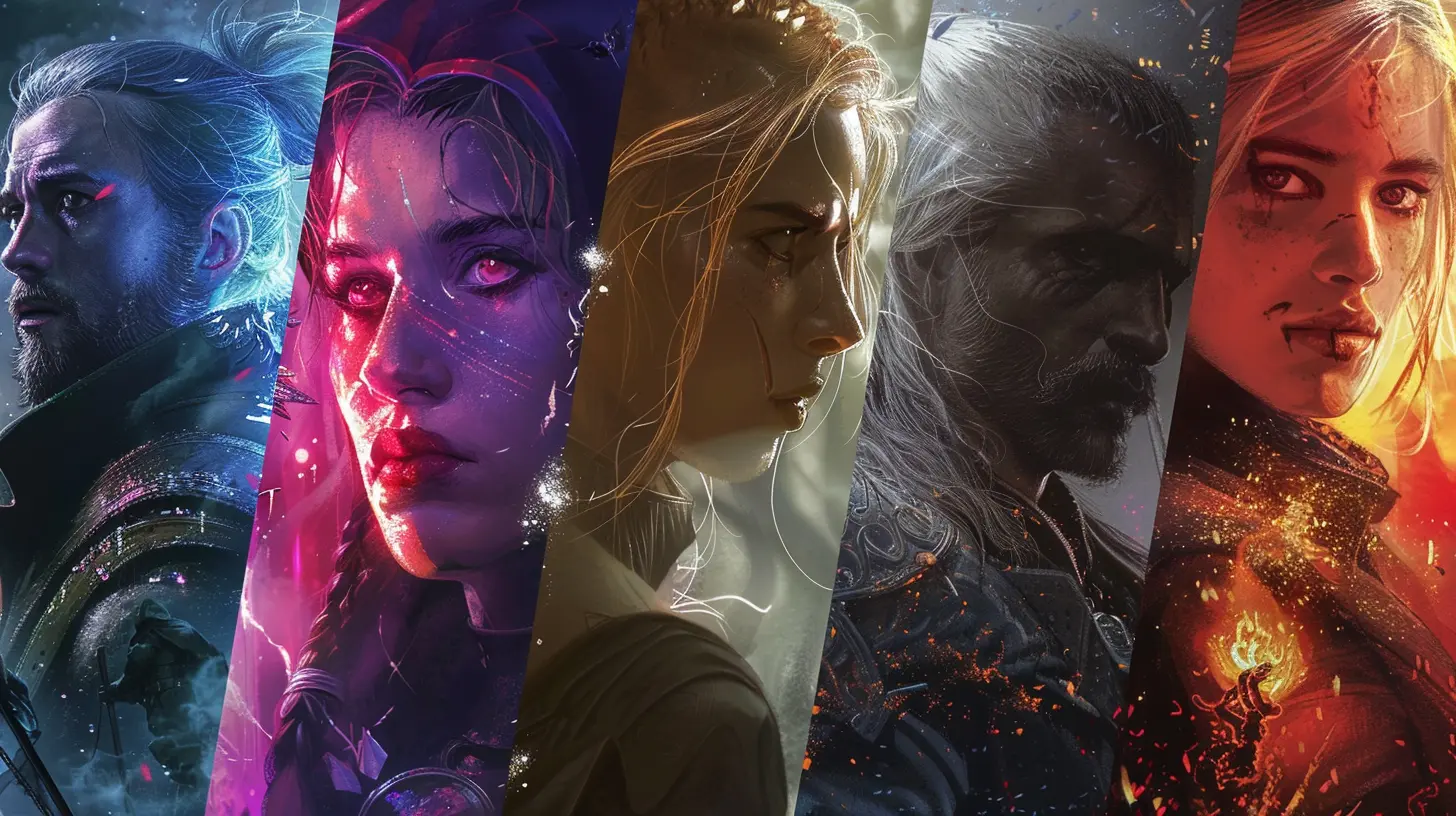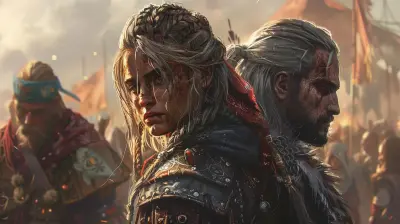Adaptive Storylines: How Your Choices Shape Fantasy Games
19 July 2025
Imagine stepping into a fantasy world where every choice you make doesn’t just alter your path, but bends the entire game’s storyline around you. Sounds pretty magical, right? Well, that’s exactly what adaptive storylines in fantasy games are all about. These aren’t your typical "save the princess" tales. Instead, they’re dynamic, evolving narratives that react to your decisions—kind of like a “choose your own adventure” book on steroids.
If you love games where your decisions matter, and you get to shape the world as you play, buckle up. Today, we’re diving deep into the realm of adaptive storylines. By the end of it, you’ll understand how these immersive worlds work, why we’re so hooked on them, and how they’ve redefined the very essence of gaming. Ready? Let’s go!
What Are Adaptive Storylines, Anyway?
Let’s start with the basics. An adaptive storyline is essentially a narrative in a game that changes based on your choices. Unlike traditional games where the story is set in stone, here, you’re calling the shots. Think of it like being both the actor and the director in a blockbuster fantasy movie. Your every move, dialogue choice, or moral decision crafts a story that feels personal—tailored just for you.For example, in games like The Witcher 3: Wild Hunt, your dialogue choices and actions directly affect the fate of characters, entire kingdoms, and even the ending. A single decision can ripple across the storyline like tossing a stone into a calm lake—it’s unpredictable, exciting, and oh-so-satisfying.
Why Do Gamers Love Adaptive Storylines?
Gaming, at its core, is about immersion. That feeling of truly being in another world. And what better way to achieve that than by letting players leave their mark on the story? Here’s why adaptive storylines have captured every player's heart:1. They Make You Feel Heard
Ever played a game where every path feels pre-determined? Yeah, it’s frustrating. Adaptive storylines break that mold by putting you in control. It’s like the game is saying, “Hey, your choices matter here. We’re listening.” That level of agency is empowering—you’re not just a passive spectator; you’re a co-creator.2. Replay Value Galore
Who doesn’t love a game they can play again and again without it feeling repetitive? Because these storylines adapt to your decisions, no two playthroughs are exactly the same. Your first time, you might play the virtuous hero who saves everyone. The next? A ruthless anti-hero who flips the world on its head. Each choice branches out like a tree, making every replay a fresh experience.3. Real Emotional Stakes
When your choices can lead to profound consequences—like the death of a beloved character—it hits different. Suddenly, every decision feels weighty, and every action has emotional depth. It’s not just a game; it’s a storytelling experience that tugs at your heartstrings.
How Adaptive Storylines Work Behind the Scenes
Okay, so we just established how awesome adaptive storylines are. But how do developers actually make them work? Magic? Sorcery? Nope—it’s a mix of clever programming, branching narratives, and a sprinkle of creative genius.1. Branching Narrative Paths
Think of adaptive storylines as a tree. Your starting point is the trunk. Each time you make a choice, you branch out into different paths, leading to entirely different outcomes. This branching structure is what gives players the feeling that their decisions truly matter.For instance, in Mass Effect, your decisions don’t just affect the current game—they ripple across the entire trilogy! You’ll feel the weight of your choices from one game to the next, creating a personalized epic.
2. Complex Dialogue Systems
You’ve probably noticed those dialogue wheels popping up in games like Dragon Age or Cyberpunk 2077. These allow players to choose what their character says, and those choices can significantly alter relationships, quests, or endings. It’s like having an unscripted conversation in an otherwise scripted world—and it makes all the difference.3. Dynamic AI Systems
In more advanced games, AI plays a huge role in creating adaptive experiences. Characters can remember your past actions, form opinions about you, or even change their behavior based on your relationship. It’s kind of like having NPCs (non-playable characters) with mood swings—and honestly, who doesn’t love a bit of drama?
Iconic Fantasy Games with Adaptive Storylines
Wondering which games truly nail adaptive storytelling? Here are some heavy-hitters that set the gold standard:1. The Witcher 3: Wild Hunt
No surprise here, right? This game is the benchmark for branching narratives in fantasy gaming. Your choices don’t just shape Geralt’s fate—they influence entire kingdoms, relationships, and the lives of everyone around you. Want to betray a king or save a villain? Go for it—the consequences will haunt (or reward) you.2. Dragon Age: Inquisition
This game throws you into a war-torn world and says, “What kind of leader will you be?” Whether you choose to be a compassionate savior or a ruthless conqueror, the world changes based on your decisions. Plus, the game’s diverse companions offer some of the most meaningful character relationships in the genre.3. Fable Series
Remember Fable? It was one of the pioneers of morality-based adaptive storylines. Your choices determine whether you’re a virtuous hero or a fearsome villain, complete with corresponding changes to your appearance and how NPCs treat you.4. Divinity: Original Sin 2
If you crave intense freedom, this is your jam. Everything (and I mean everything) is influenced by your decisions. From how you interact with party members to how you approach combat, each choice weaves into a richly adaptive narrative.The Future of Adaptive Storylines: What’s Next?
As technology evolves, so does storytelling in games. The future of adaptive narratives is looking brighter—and more mind-blowing—than ever.1. AI-Driven Narratives
AI could take adaptive storytelling to the next level. Imagine NPCs that don’t just follow pre-set paths but evolve dynamically based on your actions. They’d feel less like scripted characters and more like actual people.2. Procedural Storytelling
Some developers are exploring procedural generation for narratives, where the game can create entirely new stories on the fly. This could make games infinitely replayable, with each playthrough offering a brand-new experience.3. Enhanced Emotional Depth
With advancements in motion capture and voice acting, characters in future games will feel even more real. Combine that with adaptive storylines, and we’re looking at emotionally gripping stories that blur the line between gaming and cinema.Tips for Gamers: How to Maximize Your Experience
If you’re diving into games with adaptive storylines for the first time, here are a few tips to make the most of your journey:1. Embrace Your Choices: Don’t stress about making the “right” decision. The beauty of these games is in crafting your story—flaws and all.
2. Take Your Time: Talk to NPCs, explore side quests, and immerse yourself in the world. The more you invest in the story, the more rewarding it becomes.
3. Replay, Replay, Replay: Don’t be afraid to start over and make different choices. You’d be surprised how much the story can change.
Final Thoughts
Adaptive storylines are proof that gaming isn’t just about beating bosses or scoring points—it’s about telling your own story. They let us step into fantastical worlds where we’re not just players, but architects of our destinies. Whether you’re forging alliances, breaking hearts, or deciding the fate of kingdoms, every choice makes the story uniquely yours. That’s the magic of gaming in its truest form.So the next time you fire up a fantasy game, remember: it’s not just a game—it’s your story waiting to unfold. Make it epic.
all images in this post were generated using AI tools
Category:
Fantasy GamesAuthor:

Stephanie Abbott
Discussion
rate this article
2 comments
Mae King
Wow, adaptive storylines are like a choose-your-own-adventure book on steroids! 🎮✨ It’s thrilling to see how my choices can turn a heroic knight into a mischievous jester—or a cat-loving wizard! Can’t wait to dive into these fantasy worlds and see where my whims lead!
November 16, 2025 at 5:24 AM

Stephanie Abbott
Thank you! I'm thrilled you’re excited about the possibilities of adaptive storylines. Your choices truly bring these worlds to life! 🎮✨
Willow Larsen
Great insights! Adaptive storylines truly enhance our gaming experiences—choices make each journey unique.
August 7, 2025 at 4:40 PM

Stephanie Abbott
Thank you! I'm glad you enjoyed the insights on adaptive storylines and their impact on gameplay. Choices really do make every adventure special!


